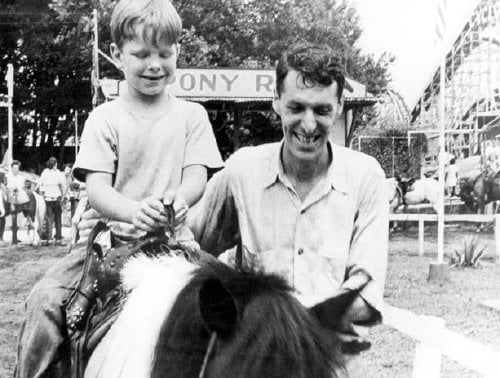Little Fugitive

When their widowed mother is called away to their grandmother's sick bed, 12 year old Lennie's (Richard Brewster) birthday outing to Coney Island is upended because he has to stay home and take care of his 7 year old brother. Joey (Richie Andrusco) tags after Lennie and his friends and they play a mean trick on him, convincing him that he's shot and killed his older brother. With the idea of Coney Island fresh in his mind, Joey grabs their grocery money and becomes a "Little Fugitive."
Laura's Review: B+
This landmark 1953 docudrama, cowritten and directed by Ray Ashley, Morris Engel and Ruth Orkin, had a huge influence on the French New Wave with its young protagonist, inexperienced actors and poetic, naturalistic style. The filmmakers not only tell Joey's story, but have preserved a way of life, a place and time that is long gone. It is startling to see wide open fields in Brooklyn, just as it is to consider a 12 and 7 year-old being left alone in a NYC apartment. Young Andrusco is a natural, his fear quickly giving away to adventure when he gets off the train at Coney Island with a whole six dollars in his pocket. We follow the little guy as he rides on a merry-go-round, gets a novelty photo taken and keeps going back to the 3-ball toss. Joey, who had no appetite for a homemade lunch, indulges in Pepsis, hot dogs (Nathans!), cotton candy, watermelon and corn on the cob, then mixes it all up on a jiggly ride. But the little kid's heart is really lost when he spies the pony ride attraction - just as he's almost run out of cash. The filmmakers establish their concepts early - Joey loves horses (that merry-go-round and the cowboy picture are early indicators and besides, Lennie has told us so) and covets his brother's harmonica ('Home on the Range' played on the instrument is his theme). The promise of a pony ride begins a new adventure once Joey observes empty soda bottles being cashed in, and his series of visits funded with fresh quarters not only have a delightful progression, but provide a resolution when new friend the pony ride man (Jay Williams) grows concerned. As charming as the film is, it is a little nagging that Joey appears to so easily rebound from Lennie's 'death,' although gun imagery keeps cropping up as a reminder. The film clearly was not shot with sync sound, which is sometimes painfully obvious, but the camera, filming in black and white, always appears to be in the right place, shots beautifully composed making maximum use of natural light and dark. "Little Fugitive" is a charmer from another age.

